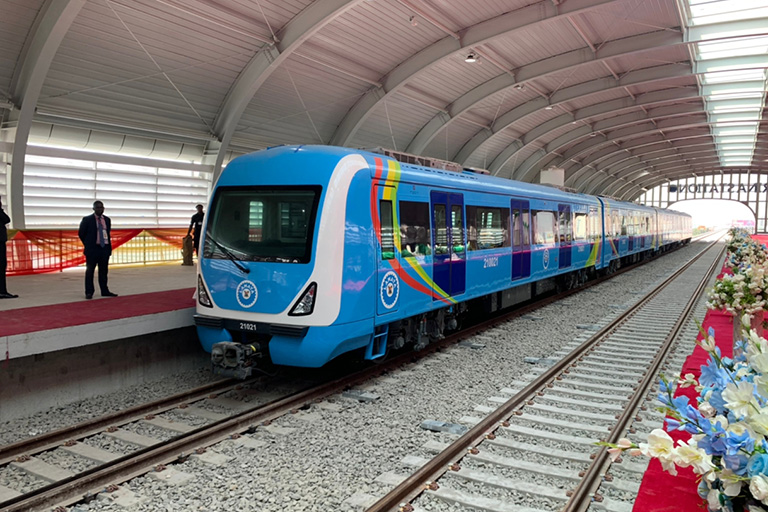The Lagos Mass Transit System in Nigeria represents a new future for transport in one of Africa’s most populous and rapidly growing megacities.
Situated on the southwestern edge of Nigeria, with views out across the Gulf of Guinea, is the gigantic metropolis of Lagos. Its glittering spires loom over the city sprawl, which stretches across a lagoon to cover several islands and a bustling international harbour.
As Lagos grapples with the challenges that come with urbanisation, transportation has become a crucial municipal issue, with the city’s rapidly increasing population pushing its existing infrastructure to its limits.
The largest city on the continent, according to UN figures Lagos’ population of 15,946,000 in 2023 is double what it was in the year 2000. This rapid expansion has brought challenges, leading to overcrowding, inadequate housing, and severe traffic congestion.
However, urbanisation has also fostered a flourishing innovation sector, a dynamic cultural scene, and economic growth, positioning Lagos as an emerging global city.
Managing its population and urban challenges is essential for its sustainable development and the city’s mass transit system is set to play a significant role.
Joined-up thinking
The Lagos Mass Transit System encompasses a range of transportation modes, including buses, ferries, trams, and a growing network of steel-built railways. This variety allows commuters to opt for the most convenient and efficient means of getting around the city, reducing traffic congestion and improving overall mobility.
At the heart of the new transit system is the city’s ambitious railway network. Lagos is a sprawling metropolis, and its rail system serves as a lifeline, connecting various parts of the city and the surrounding region.
With Lagos built over a network of lagoons, bridge construction is essential for the city’s transit system. With salt water and mangrove swamps forming large sections of the local environment, steel’s durability and ability to be applied with corrosion-resistant coatings makes it the material of choice for the city’s network of bridges.
The expansion of the transit network has been a game-changer, offering a faster and more reliable alternative to road transportation. The first expansion – the Blue Line – opened in September 2023, runs 27km from Okokomaiko in the town of Ojo all the way to the Lagos Marina.
 The Lagos mass transit systems new stainless-steel trains run on their own independent energy network
The Lagos mass transit systems new stainless-steel trains run on their own independent energy network
The train line, which is moving 250,000 commuters every day, also offers transport even during the city’s frequent power outages as its electricity is supplied by an 18MW, independent power plant through a public-private partnership.
The stainless-steel-bodied 750V dc trains allows for a direct connection between the Lagos’s southwestern outskirts and the economic heart of the city, offering easy access to its financial and retail districts. The Lagos Mass Transit System generates a substantial economic impact, creating jobs and stimulates local economies along its transit routes.
Lagos is notorious for its traffic congestion, with commuters spending up to three hours in gridlock each day. The mass transit system is a crucial step towards alleviating this issue. By providing efficient public transportation options, it encourages people to leave their cars at home, reducing the number of vehicles on the road.
Reducing traffic isn’t merely a matter of transport accessibility. With Lagos the 10th most polluted city in Africa, the need to tackle the city’s low air quality is also of paramount importance.
The mass transit system contributes to a reduction in air pollution and carbon emissions by making commuters more likely to opt for public transport over personal vehicles. This shift towards cleaner and more sustainable transportation is beneficial for the environment.
The Lagos Mass Transit System represents a transformative force in a city where transport is a growing concern. By providing diverse and efficient mobility options, Lagos is able to tackle congestion, improve the local environment and provide a vital economic boost.
Images: Lagos Metropolitan Area Transport Authority (LAMATA)